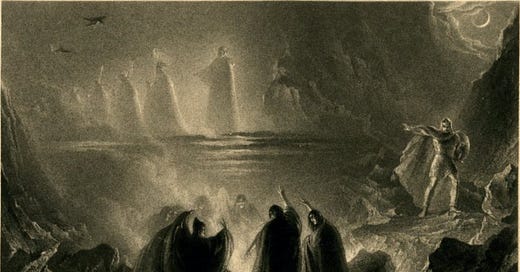Those who tell stories rule society
Hi intersectional thinkers 👋
Greetings from Lago di Como!
As I try to expand my Italian beyond si and grazie, the dictionary reminded me of this strange discovery:
The word weird used to mean ‘having the power to control destiny’.
Today, weird means ‘very strange and unusual’.
How did a weird person go from having superpowers in the 1400s to standing on the fringe of modern society?
Who gets to define the meaning of words like weird?
Apparently my French teacher, Madame Poole, had the answer.
The storytellers behind our words
When I started learning French, I was tormented by the endless exceptions to the grammatical rules.
Which weirdo contorsionniste française decided it was a good idea to force ‘aller’ into the shape of ‘je vais, tu vas, il/elle va’!?
Madame Poole seemed to have heard me complaining in my nightmare as I obsessively conjugated aller in all the tenses. Before our weekly conjugation quiz, she addressed the complaint with a mini history lesson:
You know, the rules of French are frustrating because the language is alive.
The grands écrivains of the 17th century - Voltaire, Jean Jacques Rousseau, Diderot, Descartes - they would write influential pieces, and their idiosyncratic use of French in their writing became the rules.
Isn’t it amazing that literature shaped the modern French language, not just the other way around?
[dramatic pause]
Busy trying to recite all versions of aller in passé simple in my head, I didn’t share her amazement at the time.
But more than a decade later, I found out that William Shakespeare was behind the changed definition of weird.
That’s when it clicked.
The greatest English dramatist was so successful in popularizing the odd and frightening Weird Witches in Macbeth, that their strangeness became the definition of weird as we know it today.
This meant Shakespeare created a new synonym for ‘strange’.
But this also meant he erased the idea of being able to control destiny.
Without a word to contain this idea, the idea itself loses fidelity.
The real rulers of society
By changing the meaning of weird, Shakespeare weakened the Modern English speakers’ affinity to the concept of controlling destiny. In the process, he also reduced our ability to grasp that same concept.
Shakespeare wasn’t just using English to write, he was shaping the Modern English language with how he wrote, which then shaped how the Modern English speaker, like you and I, think.
Like Madame Poole said, our language is alive. The storytellers are the ones defining the rules.
But perhaps their influence extends far beyond language.
As Plato boldly puts it: “Those who tell stories rule society.”
Have a great week,
Vicky



